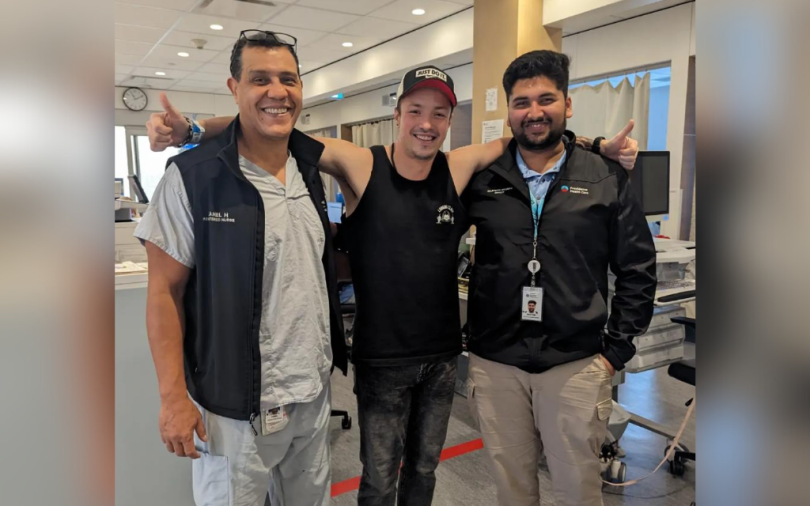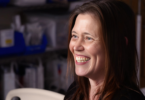When staff at the St. Paul’s Hospital Emergency Department offered to connect Max McBride with a detox bed through Access Central when he became extremely ill from an alcohol relapse, he assumed he would have to wait a few weeks to get the treatment bed and worried how he might manage in the interim.
To his shock, he was offered a bed upstairs at the Road to Recovery unit immediately.
“In two or three weeks, who would have known what would have happened, right?” reflects Max. “I was grateful to have the process started immediately that day, because that was obviously a situation where I needed to be there.”
For Max, who had never previously accessed withdrawal management support, it was a lifeline extended just when he needed it most. “It saved my life. I felt very safe and secure and I knew that it was the right place to be at that time.”
In addition to the speed of accessing a bed, Max was astonished by the range of supports available to help him navigate both his time in the hospital, and the next steps in continuing his recovery.
“When I first went in, I was really worried about my life and my career,” says Max. “But the doctor was a rockstar, and she went over and beyond to help me with the notes and documentation I needed for work. They made it quite painless to go through the whole process, to be honest.”
Max is one of the nearly 300 clients who have received rapid, personalized treatment for a substance use disorder at St. Paul’s Hospital since the first 14 withdrawal-management beds opened in a renovated wing of the hospital six months ago. In a remarkable departure from historical norms, the Road to Recovery program has drastically reduced wait times, ensuring access to vital services for those who need it most within a day.
Road to Recovery was co-developed by Providence Health Care and the BC Centre on Substance Use, is partnered with Vancouver Coastal Health and is uniquely funded by the Province of BC and donors to the St. Paul’s Foundation. When fully implemented in March 2025, Providence will operate 25 detox beds, 20 transition beds and 50 treatment and recovery beds in a seamless continuum of care across the region. The program is now slated for provincial expansion.
The right care at the right time in the right place
A key factor in the program’s ability to offer same-day services has been an expansion of Access Central, the centralized intake point for individuals seeking substance use stabilization and withdrawal management services in the Vancouver region, and the implementation of a standard clinical assessment to prioritize those in immediate need of care. PHC and VCH are working together to look at ways to integrate services across the Vancouver area.
“The addition of a clinical assessment has been instrumental in streamlining the process,” says Brynn Grierson, Program Director, Urban Health and Substance Use, at Providence Health Care. “We’ve consistently met our target, with 100% of high-priority cases receiving access to R2R beds within 1-3 days.”
The St. Paul’s Road to Recovery withdrawal management beds are prioritized for patients who are at higher risk of serious symptoms during withdrawal, while clients needing less acute care are triaged to Vancouver Detox or South Van Withdrawal Management (which recently moved from Harbour Light detox). The option of same-day virtual care through Lighthouse is also proving to be a successful and accessible option for clients who aren’t acute enough to access a same-day treatment bed, but who are ready to accept help the day they reach out for it.
“Some folks are calling Access Central and realizing that they don’t actually need a bed-based service, that they can get appropriate care in an outpatient setting,” says Brynn. “Others, they may find out that they’re not triaged for a bed that day, but they can now get access to a methadone or suboxone prescription right away and be connected to services while they wait, so it lessens their risk. When we can offer help within 24 hours, there’s a lot more success.”
Unexpected beneficial outcomes
Leading up to the program opening, staff had anticipated that clients would benefit from in-hospital consultative services, but they had underestimated the myriad ways that Road to Recovery would help give people their health back.
“We’ve definitely had people have surgeries – a transplant, even – that they probably wouldn’t have been able to have had they not been on the unit,” says Jennie Coll, Nurse Educator for Road to Recovery. “Clients are here because they want to be here. And then as an added benefit of their being here and making this difficult decision for themselves, they’ve been able to get these surgeries because they have been able to maintain abstinence on the unit and be safe and ready for surgery.”
Such was the case for Melissa. Desperately in need of a bowel resection surgery, her struggle with substance use disorder made it difficult for her to get the care she needed.
“Every time a doctor saw me, I’d basically get turned away,” Melissa recalls. “I was told it was the worst they’d ever seen, but it wasn’t considered an emergency. I was at a place where I was in so much pain that I was contemplating taking my life.”
After being admitted to Road to Recovery on the same day she reached out for help, she received the news she’d been waiting two years for. “I woke up one morning to hear a doctor saying, ‘Guess what? I have great news.’ There was a surgery booked for me in 11 days.”
Five months later, Melissa is living pain-free and substance-free. “Road to Recovery did so much to save my life, and I’m so grateful for the program.”

A nurturing, supportive environment
At the heart of the program lies a commitment to understanding and addressing the diverse needs of people who use substances.
While on the unit, clients have access to tablets and art supplies to keep themselves busy. Coffee, tea and snack are plentiful and available all day. By their third day on the unit, people typically feel well enough to join in on the group programming put on by interdisciplinary team members such Occupational Therapy, Indigenous Wellness and with Peer Mentors. Clients are also a major source of support for each other, and staff often witness friendships being built on the unit.
“The most popular group we have is the coffee group, and it’s just all informal – everyone sitting together and having coffee, having a chat,” says Jennie. “I think it actually elicits people to share more about themselves because they’re just sitting there with coffee in their hand, and it feels more like being with friends than being in a program.”

Putting trust in the health care system isn’t easy for many of the clients who come to Road to Recovery, many of whom have previously experienced feeling judged and stigmatized while receiving care.
“There was one patient who specifically said that they had never felt safe in a hospital before, but they felt safe on the Road to Recovery unit,” says Jennie. “That was really profound because it made it feel like we are doing the job we were hoping to be doing.”
The power of Peers
For Brynn, the presence of Peers as part of the Interdisciplinary Team has been tremendously beneficial in building trust with clients, “They offer a level of knowledge, experience and relational practice that has a really big impact.”
Working as a Peer Mentor at Road to Recovery has been like coming full circle for Ian Haynes, who has been in recovery for 12 years. “When the job came up, I was just so happy to get a chance to give back, because in my previous life I feel like I took a lot from the community. Having the opportunity to help people that are experiencing the same thing I did, and to be a voice for them, is a real passion for me.”

From helping new admits get settled on the unit, to being a supportive presence during a client’s conversations with the medical team, Peers perform a variety of compassionate, person-centred duties at Road to Recovery.
Initially hired as a Peer Mentor in Road to Recovery, Ian’s role has since expanded to Peer Coordinator, responsible for overseeing a total of nine Peer Mentors working in other areas of the hospital, such as with the Addiction Medicine Consult Team and the Urban Health Inpatient Unit on 8A. Ian credits the staff within the Urban Health and Substance Use program with creating an atmosphere that lets Peers thrive. “The team is very dynamic and everybody works together. The staff is really welcoming and supportive of the peers here.”
For Ian, supporting clients as they make the journey from illness to recovery has been incredibly rewarding. “Getting to know their real characters and seeing them smile and start to have a little bit of hope – that’s my favorite part.
Story by Megan Birnie, with files from Claire Martindale, Providence Health Care





